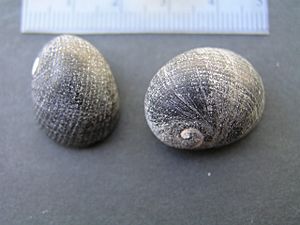Nerita atramentosa facts for kids
Quick facts for kids Nerita atramentosa |
|
|---|---|
 |
|
| Scientific classification | |
| Kingdom: | |
| Phylum: | |
| Class: | |
| (unranked): |
clade Neritimorpha
clade Cycloneritimorpha |
| Superfamily: |
Neritoidea
|
| Family: |
Neritidae
|
| Subfamily: |
Neritinae
|
| Genus: |
Nerita
|
| Species: |
N. atramentosa
|
| Binomial name | |
| Nerita atramentosa Reeve, 1855
|
|
The black nerite, also known as Nerita atramentosa, is a cool medium-sized sea snail. It's a type of mollusc that lives in the ocean, belonging to the Neritidae family. Think of it as a small, tough snail that loves hanging out on rocks by the sea!
Scientists sometimes get a bit confused when classifying animals, especially snails that look similar. For a while, the black nerite (Nerita atramentosa) was thought to be the same as another snail called Nerita melanotragus. But now, experts agree they are two different species.
Contents
What Does the Black Nerite Look Like?
The shell of the black nerite can be anywhere from 12 mm (about half an inch) to 32 mm (about one and a quarter inches) long. It's a sturdy shell that helps protect the snail.
Where Does the Black Nerite Live?
Its Home in Australia
This special snail is found only along the southern coast of Australia. This includes areas like South Australia, southern Western Australia, and Victoria. It also lives in Tasmania. When an animal is found only in one specific area, we say it is endemic to that place.
The Nerita atramentosa lives west of Wilsons Promontory in western Victoria, South Australia, and southern Western Australia. Its close relative, Nerita melanotragus, lives in eastern Victoria, New South Wales, and Tasmania.
Finding a Home on the Rocks
You can often spot black nerites on rocks between the high and low tide marks. They especially like to attach themselves to sloped or vertical rock surfaces. Sometimes, they even hang upside down from the bottom of rocks!
This clever trick helps them stay cool. If they were on a flat, sunny rock, they would soak up a lot of heat from the sun. By being on an angle or underneath a rock, they absorb less sunlight. This helps them control their body temperature.
Black nerites also follow each other's trails. They eat by scraping tiny algae off the rocks using a special tongue-like tool called a radula. But watch out! Reef crabs, like the Ozius truncatus, sometimes like to snack on these snails.
 | Precious Adams |
 | Lauren Anderson |
 | Janet Collins |

